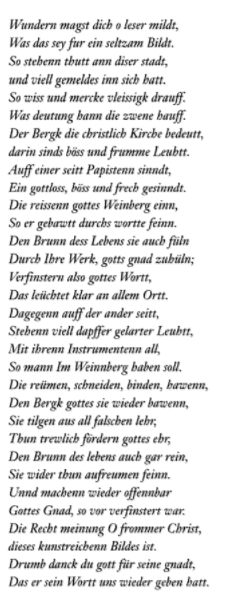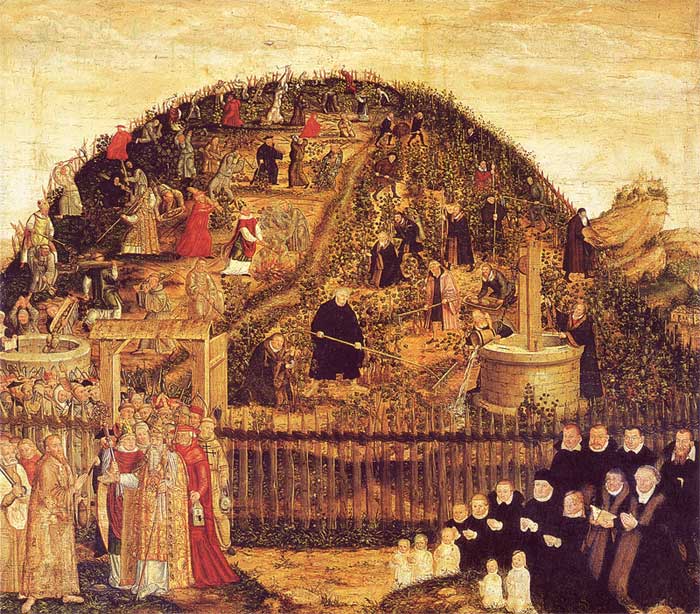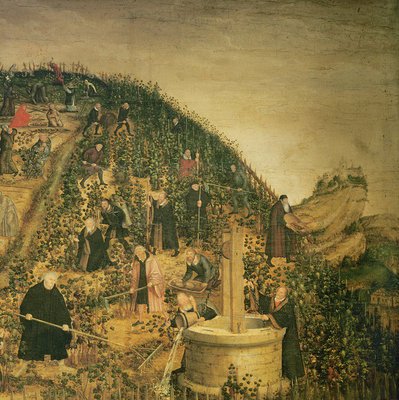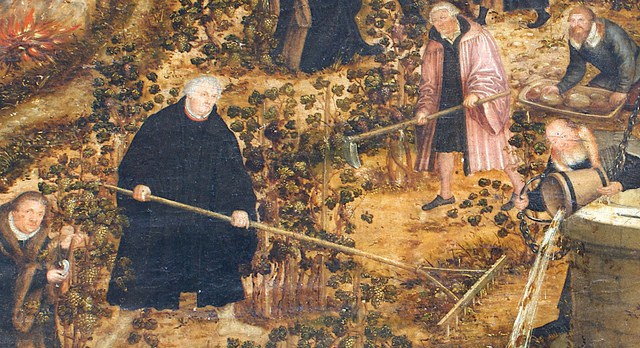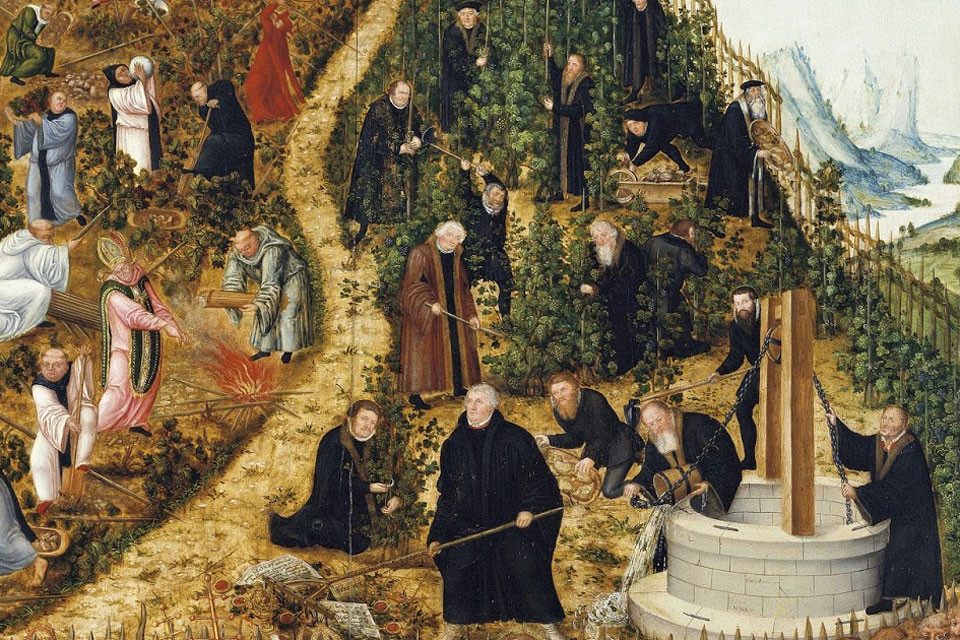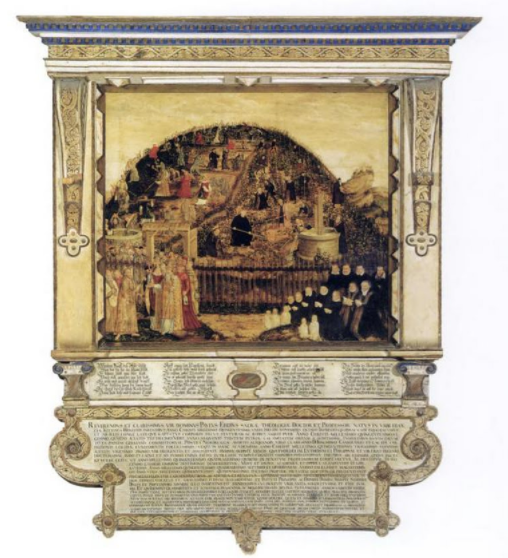The Vineyard of the Lord, Lukas Cranach the Younger (1515-1586)
The Gospel for October 8 (Trinity XVII) is the parable of the Vineyard.
The first reading is from Isaiah 5:
Let me sing for my beloved
a love song concerning his vineyard:
My beloved had a vineyard
on a very fertile hill.
2 He digged it and cleared it of stones,
and planted it with choice vines;
he built a watchtower in the midst of it,
and hewed out a wine vat in it;
and he looked for it to yield grapes,
but it yielded wild grapes.
3 And now, O inhabitants of Jerusalem
and men of Judah,
judge, I pray you, between me
and my vineyard.
4 What more was there to do for my vineyard,
that I have not done in it?
When I looked for it to yield grapes,
why did it yield wild grapes?
5 And now I will tell you
what I will do to my vineyard.
I will remove its hedge,
and it shall be devoured;
I will break down its wall,
and it shall be trampled down.
6 I will make it a waste;
it shall not be pruned or hoed,
and briers and thorns shall grow up;
I will also command the clouds
that they rain no rain upon it.
7 For the vineyard of the Lord of hosts
is the house of Israel,
and the men of Judah
are his pleasant planting;
and he looked for justice,
but behold, bloodshed;
for righteousness,
but behold, a cry!
Psalm 80 continues the image:
8 You brought a vine out of Egypt;
you drove out the nations and planted it.
9 You cleared the ground for it;
it took deep root and filled the land.
10 The mountains were covered with its shade,
the mighty cedars with its branches;
11 it sent out its branches to the sea,
and its shoots to the River.
12 Why then have you broken down its walls,
so that all who pass along the way pluck its fruit?
13 The boar from the forest ravages it,
and all that move in the field feed on it.
14 Turn again, O God of hosts;
look down from heaven, and see;
have regard for this vine,
15 the stock that your right hand planted.[b]
16 They have burned it with fire, they have cut it down;[c]
may they perish at the rebuke of your countenance.
17 But let your hand be upon the one at your right hand,
the one whom you made strong for yourself.
18 Then we will never turn back from you;
give us life, and we will call on your name.
And Jesus uses it in the Gospel (Matthew 21)
Hear another parable. There was a householder who planted a vineyard, and set a hedge around it, and dug a wine press in it, and built a tower, and let it out to tenants, and went into another country. 34 When the season of fruit drew near, he sent his servants to the tenants, to get his fruit; 35 and the tenants took his servants and beat one, killed another, and stoned another. 36 Again he sent other servants, more than the first; and they did the same to them. 37 Afterward he sent his son to them, saying, ‘They will respect my son.’ 38 But when the tenants saw the son, they said to themselves, ‘This is the heir; come, let us kill him and have his inheritance.’ 39 And they took him and cast him out of the vineyard, and killed him. 40 When therefore the owner of the vineyard comes, what will he do to those tenants?” 41 They said to him, “He will put those wretches to a miserable death, and let out the vineyard to other tenants who will give him the fruits in their seasons.”
Cranach in 1582 painted the Protestant interpretation of this metaphor.
The painting once hung in Martin Luther’s parish church of St. Mary’s in Wittenberg. Cranach created this painting in memory of the Reformer Paul Eber, who lectured on theology in Wittenberg. Paul Eber, his wife, and and his thirteen children kneel on the right, The ones in white died in infancy.
It is riposte to a statement that Pope Leo X had made in response to Luther’s posting of his Ninety-five Theses. The pope excommunicated Luther, tossing him out of the Church, in Exsurge, Domine exclaiming famously, “The wild boar from the forest seeks to destroy the vineyard.”
The Lord’s Vineyard is defined as the central motif of the composition by a surrounding fence, which separates it from the landscape behind. A path divides this vineyard into two sections: Catholic left and Protestant right.
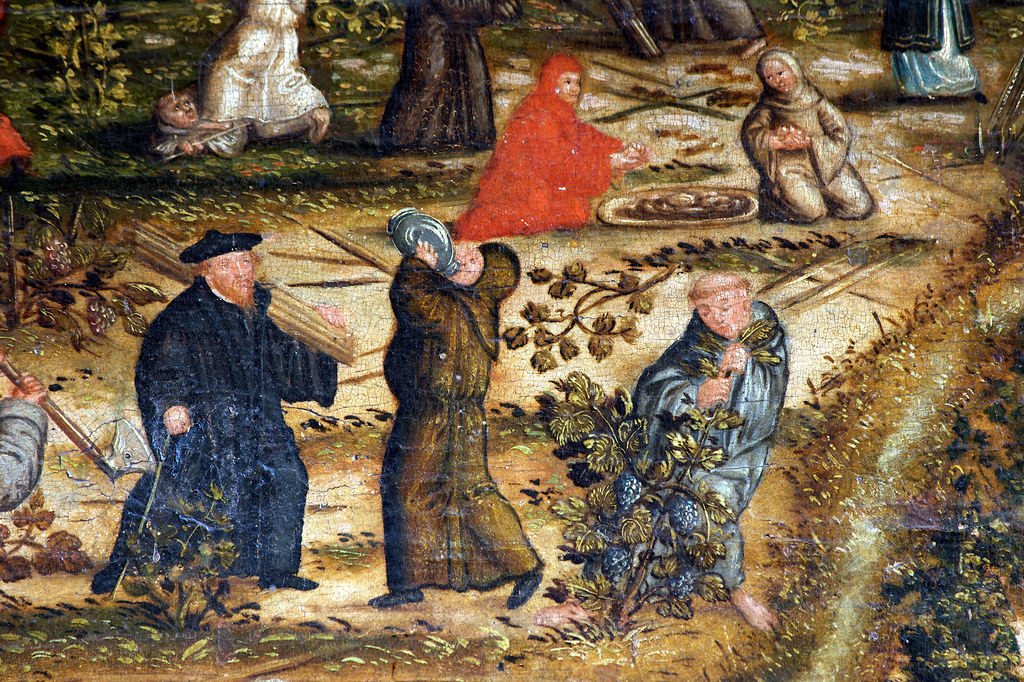
14.4.2009: from Lucas Cranach the Younger, ‘Vineyard of the Lord’ (1569), Stadtkirche St-Marien, Wittenberg.
On the left side, the vineyard has withered from neglect and mismanagement. The pope, cardinals, bishops, priests and monks are hard at work … ripping out the vines and throwing rocks into the well. They are destroying the Good News of Jesus Christ with their false doctrines of the worship of Mary and the saints, purgatory, penance, indulgence, etc. They have ripped out the true salvation story contained in the words and person of Jesus Christ, who is the Vine to whom we are connected by faith. The monks are getting drunk and pulling up the vines.
But on the Protestant right, the vineyard is flourishing under Lutheran cultivation. Twelve reformers associated with Wittenberg, ranging from Martin Luther (d. 1546) to the young Matthias Flacius Illyricus (d. 1575), clear the land and prune and irrigate the new, healthy plants.
Luther in his black doctoral gown with a rake and other Reformers take care of the plants by watering them and pulling out the weeds. John Bugenhagen, Luther’s confessor and a contributor to the Augsburg Confession is in the center wearing a light-colored robe as he tills the soil.
Phillip Melanchthon, author of the Augsburg Confession, is drawing the pure waters of the Scriptures (ad fontes).
In the foreground a procession of clerics, lead by the pope, has stepped beyond the fenced area to meet with Christ and the apostles. The Pope seems to be offering Jesus money to gain admission to heaven, and Jesus is refusing it. Perhaps it is an allusion to Tetzel’s (alleged ) couplet “As soon as the coin in the coffer rings, the soul out of purgatory springs” (Sobald der Pfennig im Kasten klingt, die Selle aus dem Fegfeuer springt), which he is supposed to have used to preach the sale of indulgences which would release souls from Purgatory.
Jesus, like the owner of the Vineyard, is carrying a bag with money with which he will pay the true workers in the vineyard, i. e., the Reformers.
This is the frame and epitaph.
In case the meaning of the painiting escaped you:
